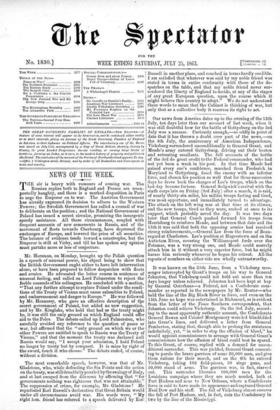Mr. Horsman, on Monday, brought up the Polish question in
a speech of unusual power, his object being to show that the British Government ought either to have left intervention .alone, or have been prepared to follow despatches with fleets and armies. He advocated the latter course in sentences of unusual feeling, and called on Lord Palmerston to reject the feeble counsels of his colleagues. He concluded with a motion, "That any further attempt to replace Poland under the condi- tions of the Treaty of Vienna must cause calamities to Poland, and embarrassment and danger to Europe." He was followed by Mr. Hennessy, who gave an effective description of the .secret government of Poland, but added no new suggestion, and by Mr. Kinglake, who held that bad as the treaty might be, it was still the only ground on which England could offer .aid to the Poles. The debate called up Lord Palmerston, who earefully avoided any reference to the question of peace or war, but affirmed that the "only ground on which we or the ether Powers are entitled to speak to Russia was the Treaty of Vienna," and that the moment the treaty was declared null Russia would say, "I accept your admission, I hold Poland no longer by treaty but by conquest. It is mine by right of the sword, touch it who choose." The debate ended, of course, without a division.






























